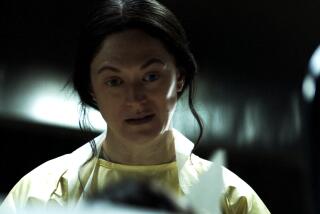Haunting first season show leaves a lasting impact
I remember the moment when I realized film could make horror beautiful and thus even more horrifying (“Apocalypse Now”) or a stage actor could be so mesmerizing you forget he’s on a stage ( Derek Jacobi in “Breaking the Code”). But not like I remember the moment I understood how powerful and long-lasting an hour of television could be.
The 20th episode of the first season of “ER” is titled “Love’s Labor Lost,” but if you meet a woman over 30, or any OB-GYN, all you have to do is put your hands on your lower belly and say “that ‘ER,’ ” and they will smile grimly and nod. If “Jaws” made a generation afraid of the ocean, “Love’s Labor Lost” . . . well, if it can’t be blamed for declining birth rates, it no doubt contributed to sales for every pregnancy guide ever written.
As with any episode of “ER,” there was a tangle of story lines, but the only one that mattered begins when a couple, played by Bradley Whitford and Colleen Flynn, come in. The woman is close to her due date, and she’s suffering stomach pain and frequent urination. Dr. Mark Greene ( Anthony Edwards) tells her it’s probably just a bladder infection and sends her on her way. Other stuff happens -- Dr. Benton’s mother had a broken hip, which causes him much concern -- and the pregnant woman has a seizure in the parking lot. Nothing seems terribly dire even then -- she stabilizes and after speaking with her OB-GYN, Greene decides to induce.
As the episode unfurls, one thing goes wrong and then another -- the baby’s shoulder gets stuck, the mother’s blood pressure drops -- until a panicked Greene performs a brutal emergency C-section. “What did you use, a chain saw?” asks the obstetrician when she finally shows up. Although the baby is saved, the woman dies, her body transformed from living person into scooped-out husk in a matter of moments.
When I saw that episode, pregnancy could not have been further from my mind. But I felt like the federal government should have issued a warning to all women of child-bearing years, preferably from loudspeakers on every street corner. I remember creeping to my phone and calling all my female friends until I found someone who had seen it so we could talk each other down. I remember it taking a very long time.
It wasn’t the gore or even the reminder of how tenuous pregnancy can still be in this modern age. It was how writer Lance Gentile and director Mimi Leder had collaborated to cause the whole terrifying, mind-blowing thing to creep up on me. To remind me that tragedy is not necessarily accompanied by a spray of bullet-shattered glass or a solemn diagnosis. Tragedy lurks in the corner of every decision, every bit of hurried advice; tragedy doesn’t always occur, sometimes it just accumulates -- until it fills the room and then empties it.
I turned on the TV to watch that season’s sexy new medical drama, and there I was, shaking and dry-mouthed and my life would never be the same.
Now I have had a lifelong issue with personal hyperbole, but that last bit turned out to be true. Over the years, I have thought about “Love’s Labor Lost” a lot, and not just during my three pregnancies. I think about it when my children get sick or when I’m driving on the freeway. I think about it when I’m feeling sorry for myself after a disappointing day and when things are going so great it seems wise to worry.
I think about that woman and how it started with an ache and the need to pee and ended in evisceration. I think about how frail the human body is and how we all carry within us our own personalized episode of “Love’s Labor Lost.”
Inevitably, through a series of events that will probably start with something unremarkable -- a headache, a weird cough, the decision to change lanes -- it will be me in that final shot. With any luck, I’ll be very old and not quite so hacked up, but who knows? So it’s important to pay attention to what is happening right now, to participate in my life as it is right now.
Not only to ensure that something serious doesn’t go wrong when I’m not looking -- there’s no ensuring that -- but to know that I got the most out of my days when it finally does.
Not too bad for a 14-year-old single episode of network television.
More to Read
The biggest entertainment stories
Get our big stories about Hollywood, film, television, music, arts, culture and more right in your inbox as soon as they publish.
You may occasionally receive promotional content from the Los Angeles Times.











